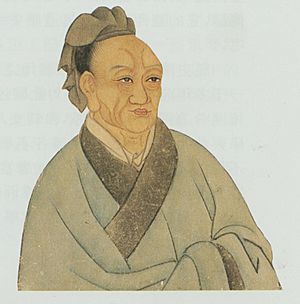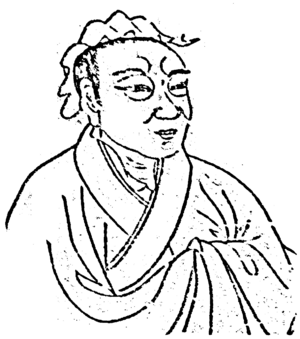Sima Qian facts for kids
Quick facts for kids
Sima Qian
|
|
|---|---|
 |
|
| Born | c. 145 or 135 BC Longmen, Han Empire (now Hejin, Shanxi)
|
| Died | c. 86 BC (after 91 BC) |
| Occupation | Astrologer, historian, poet |
| Known for | Records of the Grand Historian |
| Relatives | Sima Tan (father) |
Sima Qian ( c. 145 – c. 86 BC) was a Chinese historian of the early Han dynasty (206 BC – AD 220). He is considered the father of Chinese historiography for his Records of the Grand Historian, a general history of China covering more than two thousand years beginning from the rise of the legendary Yellow Emperor and the formation of the first Chinese polity to the reigning sovereign of Sima Qian's time, Emperor Wu of Han.
Although he is universally remembered for the Records, surviving works indicate that he was also a gifted poet and prose writer.
Contents
Early life and education
Sima Qian was born at Xiayang in Zuopingyi (around present-day Hancheng, Shaanxi Province). He was most likely born about 145 BC, though some sources say he was born about 135 BC. Around 136 BC, his father, Sima Tan, received an appointment to the position of "grand historian" (tàishǐ 太史, alt. "grand scribe" or "grand astrologer"). The grand historian position was relatively low-ranking, and its primary duty was to formulate the yearly calendarn and present it to the emperor prior to New Year's Day. The grand historian's other duties included traveling with the emperor for important rituals and recording daily events both at the court and around the country. By his account, by the age of ten Sima was able to "read the old writings" and was considered to be a promising scholar.
In 126 BC, around the age of twenty, Sima Qian began an extensive tour around China as it existed in the Han dynasty.
As Han court official
After his travels, Sima was chosen to be a Palace Attendant in the government, whose duties were to inspect different parts of the country with Emperor Wu in 122 BC. Sima married young and had one daughter. In 110 BC, at the age of thirty-five, Sima Qian was sent westward on a military expedition against some "barbarian" tribes. That year, his father fell ill and summoned his son back home to take over the historical work he had begun. Fueled by his father's inspiration, Sima Qian spent much of the subsequent decade authoring and compiling the Records of the Grand Historian. Three years after the death of his father, Sima Qian assumed his father's previous position as taishi. In 105 BC, Sima was among the scholars chosen to reform the calendar. As a senior imperial official, Sima was also in the position to offer counsel to the emperor on general affairs of state.
Records of the Grand Historian
The Li Ling affair

In 99 BC, Sima became embroiled in the Li Ling affair, where Li Ling and Li Guangli, two military officers who led a campaign against the Xiongnu in the north, were defeated and taken captive. Emperor Wu attributed the defeat to Li Ling, with all government officials subsequently condemning him for it. Sima was the only person to defend Li Ling, who had never been his friend but whom he respected. Emperor Wu interpreted Sima's defence of Li as an attack on his brother-in-law, Li Guangli, who had also fought against the Xiongnu without much success, and sent Sima to prison.
Later years and death
Upon his release from prison in 97/96 BC, Sima Qian continued to serve in the Han court as a court archivist.
The early 20th century scholar Wang Guowei stated that there are no reliable records establishing when Sima Qian died. He and most modern historians believe that Sima Qian spent his last days as a scholar in reclusion (Chinese: 隱士; pinyin: yǐnshì) after leaving the Han court, perhaps dying around the same time as Emperor Wu in 87/86 BC.
Astronomer/astrologer
Sima and his father both served as the taishi (太史) of the Former Han Dynasty, a position which includes aspects of being a historian, a court scribe, calendarist, and court astronomer/astrologer. At that time, the astrologer had an important role, responsible for interpreting and predicting the course of government according to the influence of the Sun, Moon, and stars, as well as other astronomical and geological phenomena such as solar eclipses and earthquakes, which depended on revising and upholding an accurate calendar.
Sima Qian was involved in the creation of the 104 BC Taichu Calendar 太初暦 (太初 became the new era name for Emperor Wu and means "supreme beginning"), a modification of the Qin calendar. This is the first Chinese calendar whose full method of calculation (暦法) has been preserved.
The minor planet "12620 Simaqian" is named in his honour.
Images for kids
See also
 In Spanish: Sima Qian para niños
In Spanish: Sima Qian para niños


